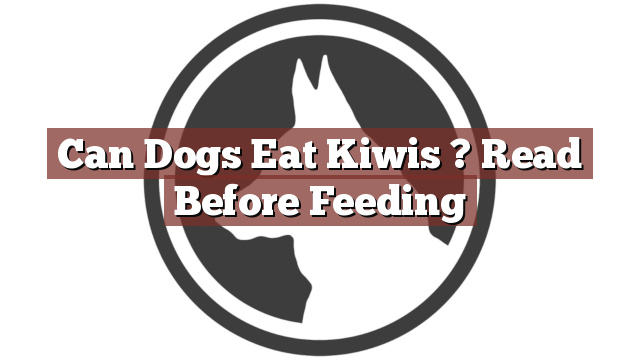Can Dogs Eat Kiwis? Read Before Feeding
Understanding Your Dog’s Dietary Needs
As a responsible dog owner, it is crucial to be aware of your furry friend’s dietary needs. Providing a well-balanced and nutritious diet is essential to maintaining their overall health and well-being. While it may be tempting to share some of your favorite fruits and snacks with your canine companion, not all foods are safe for them to consume. It’s essential to consider their specific dietary requirements before introducing any new food into their diet.
Can dogs eat kiwis?
Now, let’s address the question on every dog owner’s mind: Can dogs eat kiwis? The answer is yes, dogs can eat kiwis. However, it is crucial to proceed with caution and moderation. While kiwis are not toxic to dogs, they may not be suitable for all canines. Some dogs may have sensitivities or allergies to certain fruits, including kiwis. Therefore, it is always a good idea to consult with your veterinarian before introducing any new food into your dog’s diet.
Pros and Cons of Feeding Kiwis to Dogs
Feeding your dog kiwis can have both pros and cons. On the positive side, kiwis are packed with essential vitamins and minerals, such as vitamin C and fiber. These nutrients can contribute to your dog’s overall health and support their immune system. Additionally, the high fiber content in kiwis can aid in digestion and promote regular bowel movements in dogs.
However, it is vital to be aware of potential drawbacks as well. Kiwis have a high sugar content, and excessive consumption can lead to gastrointestinal upset in dogs. Additionally, the skin and seeds of kiwis can pose a choking hazard, and the seeds may also cause intestinal blockages. Therefore, it is crucial to remove the skin and seeds before offering kiwis to your dog. Lastly, some dogs may experience an upset stomach or diarrhea if they are not accustomed to eating kiwis or if they have any existing sensitivities or allergies.
Conclusion: Considerations for Feeding Kiwis to Your Dog
While dogs can eat kiwis, it is essential to exercise caution and moderation when introducing this fruit into their diet. Always consult with your veterinarian before adding any new food to your dog’s diet, especially if they have any underlying health conditions or allergies. When feeding kiwis to your dog, remove the skin and seeds and offer small pieces as a treat or as an occasional addition to their regular diet. Monitor your dog’s reaction closely, and if you notice any adverse effects, discontinue feeding kiwis immediately. By understanding your dog’s specific dietary needs and consulting with professionals, you can ensure that your furry friend remains healthy and happy.
Thank you for taking the time to read through our exploration of [page_title]. As every dog lover knows, our furry friends have unique dietary needs and responses, often varying from one canine to another. This is why it's paramount to approach any changes in their diet with caution and knowledge.
Before introducing any new treats or making alterations to your dog's diet based on our insights, it's crucial to consult with a veterinarian about [page_title]. Their expertise ensures that the choices you make are well-suited to your particular pet's health and well-being.
Even seemingly harmless foods can sometimes lead to allergic reactions or digestive issues, which is why monitoring your dog after introducing any new food item is essential.
The content provided here on [page_title] is crafted with care, thorough research, and a genuine love for dogs. Nevertheless, it serves as a general guideline and should not be considered a substitute for professional veterinary advice.
Always prioritize the expert insights of your veterinarian, and remember that the health and happiness of your furry companion come first.
May your journey with your pet continue to be filled with joy, love, and safe culinary adventures. Happy reading, and even happier snacking for your canine friend!

